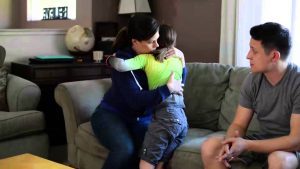 Divorce is a difficult time for parents and children alike. Your child is bound to see you feeling sad or angry despite your best attempts to hide it from them. Your child is also going to feel sad and/or angry at times. There is nothing inherently wrong with your child witnessing your emotions – it can even be healthy. However you want to avoid dumping your emotions on your child. Rather, you want to be able to talk about, and deal with, your emotions in a healthy way.
Divorce is a difficult time for parents and children alike. Your child is bound to see you feeling sad or angry despite your best attempts to hide it from them. Your child is also going to feel sad and/or angry at times. There is nothing inherently wrong with your child witnessing your emotions – it can even be healthy. However you want to avoid dumping your emotions on your child. Rather, you want to be able to talk about, and deal with, your emotions in a healthy way.
Being honest about feeling sad, angry, confused, and all the other uncomfortable emotions that may arise in this situation helps your child to feel like they are not alone with their feelings. However, parents need to be careful not to let their children feel as if they need to take care of you. Make sure that your child knows you are OK and that you are strong enough to deal with your, and your child’s feelings.
Allow your child the time to talk about his feelings. Reflect them back and show your child you understand and accept the feelings he is expressing. It is important that you validate your child’s feelings. For example, “You seem to be angry at Dad and I. It’s ok to be angry with what’s happening. I am here to talk about it with you when you are ready.” It is also useful to let your child know that they will have mixed feelings about the changes happening, and for you to be prepared yourself for your child to have some positive feelings such as relief, excitement (eg. Having a new room at one parent’s house), and humour.
If it seems too difficult to hear your child’s anger or sadness at the moment then it is a good idea to find someone else that your child can talk to. This may be your ex-partner, another family member, trusted family friend, or teacher. Professional help can also assist both you and your child to work through the difficult and strong emotions that can be provoked by a divorce.
